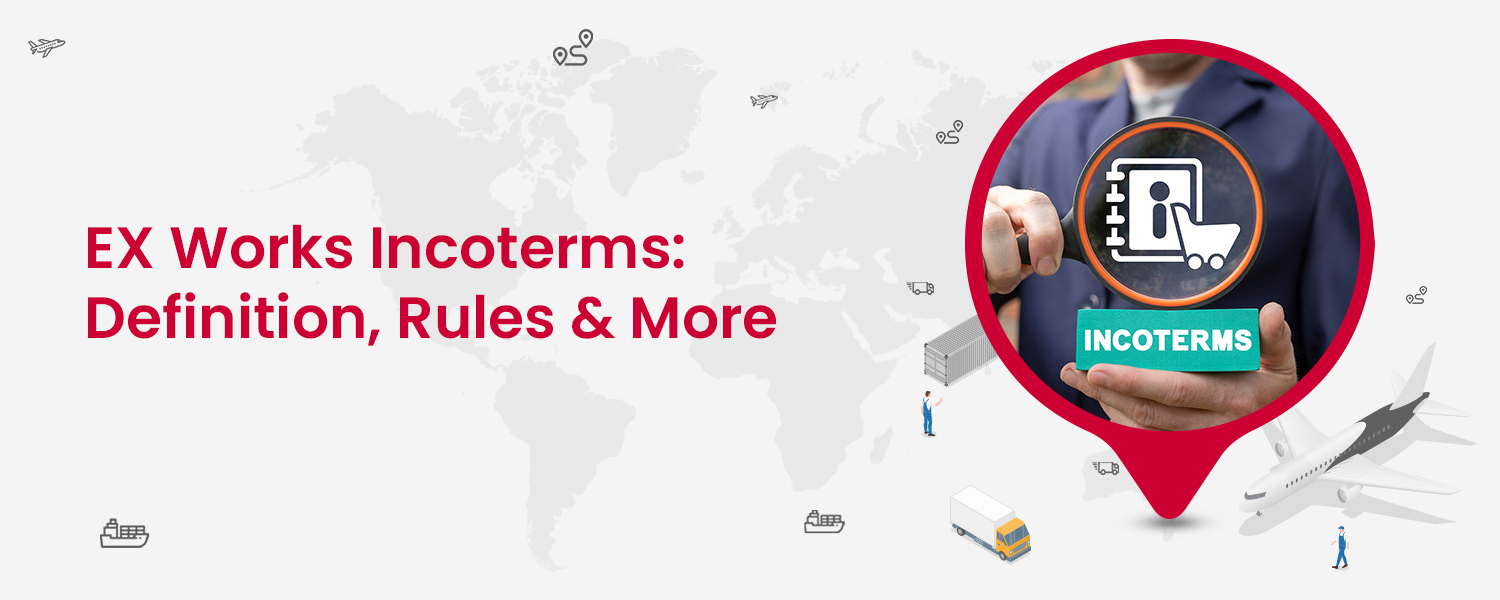International trade is where the threads of buying and selling intertwine across continents, making trade rules of the game crucial and advantageous. International trade rules, or Incoterms, make borders not barriers but gateways to new markets. EX Works is one of the incoterms (EXW) that stands as a cornerstone in international trade architecture.
EX Works unlocks new opportunities, efficiency, and growth for eCommerce businesses, particularly in the B2B sector. In the EXW agreement, the exporter’s responsibility ends at their doorstep, and the importer’s liability begins. It’s an incoterm with the power to shift responsibility, delineate the borders of liability, and redefine the dynamics between seller and buyer.
This blog focuses on EXW incoterm – dissecting its meaning, rules, and real-world examples. We invite you to join us on a journey beyond mere transactional exchanges.
What is EXW Incoterm in Shipping?
In international shipping, EXW represents a set of shipping terms that distinctly demarcate the division of responsibilities, risks, and costs between a seller (exporter) and a buyer (importer).
In practice, particularly within the corridors of eCommerce transactions, EXW sets a clear responsibility boundary, marking the seller’s obligations as complete once goods are made available for pickup at their premises, which could be a factory, warehouse, or any designated location.
From that point onwards, the responsibility is passed to the buyer, who then takes on the responsibility of arranging transportation, handling all logistics, managing export and import formalities, and bearing the associated risks and costs.
For example, consider a startup eCommerce business based in Berlin specialising in handcrafted home decor items. Seeking to expand its market reach, the company decided to export its products to a client in Toronto. Under an EXW agreement, the Berlin-based seller makes the goods available at their warehouse. The Canadian buyer, who has better knowledge of local shipping providers and Canadian import regulations, takes over the entire shipping process. They arrange for a local German freight forwarder to collect the goods, handle export customs clearance, and manage the transportation to Toronto. This arrangement under EXW allows the Berlin startup to focus on its core competency – crafting unique home decor items – without the added complexity of managing international logistics.
What are the Seller’s Responsibilities in EXW?
Packaging
The seller must ensure the goods are securely and appropriately packaged for export. This involves using materials and methods that are internationally recognised and suitable for the nature of the goods. For instance, fragile items require more secure and cushioned packaging than durable goods. This responsibility is critical as inadequate packaging can lead to damage, resulting in financial loss and potential legal complications.
Delivery
In EXW, making goods available means that the seller has to prepare and position the goods at their premises (like a warehouse or factory) for the buyer to collect. The designated location for goods availability significantly influences the buyer’s logistics planning. It’s essential for the seller to clearly define the premises and ensure the goods are accessible for collection. The implications here are substantial, as the location can affect the buyer’s transportation costs and logistical arrangements.
What are the Buyer’s Responsibilities in EXW?
Loading Charges
In EXW, the responsibility of loading the goods at the seller’s premises squarely falls on the buyer. This means that once the seller makes the goods available, the buyer must ensure that these goods are loaded onto their transport vehicle.
Delivery to Port/Place
Once the goods are loaded, the buyer must arrange transportation from the seller’s location to the port of export. Effective logistical planning is critical here. The buyer needs to ensure that the transport mode aligns with the nature of the goods, the distance to be covered, and the time frame for delivery. This step often involves a complex decision-making process, assessing cost, speed, reliability, and the geographical challenges of the intended route.
Export Duty, Taxes, and Customs Clearance
The buyer is responsible for managing and paying all export-related duties and taxes and fulfilling customs clearance requirements. The buyer must ensure that all the necessary papers, such as export licenses, commercial invoices, and packing lists, are accurately prepared and submitted. Any errors or omissions can lead to delays, additional costs, or legal issues. Keep in mind that the buyer should have an import-export code for any international trade activity.
Loading on Carriage
For the main carriage – the transportation from the origin to the destination port – the buyer must arrange for loading onto the chosen mode of transport.
Carriage Charges
The buyer is responsible for all freight transportation charges from the origin to the destination. This includes negotiating and paying for the shipping costs, which can be a significant portion of the overall logistics expense.
Choosing the right carrier is vital. The buyer should consider platforms like NimbusPost, which give international courier service recommendations based on factors such as cost, reliability, transit times, and carrier reputation.
Delivery to Destination
The final leg of the journey, from the destination port to the buyer’s facility or warehouse, is the buyer’s responsibility. This stage can present challenges such as local transport issues, route planning, and timing. The buyer should have strategies in place to deal with these potential hurdles.
Unloading at the Destination
Upon arrival at the final destination, the buyer is responsible for unloading the goods. The buyer here requires careful handling to ensure the goods are not damaged. Planning for the necessary resources, such as labour and unloading equipment, is critical. This should be arranged in advance to avoid delays upon arrival.
Import Duty, Taxes, and Customs Clearance
The buyer is responsible for handling and paying all import duties and taxes in the destination country. Adhering to local laws and regulations is paramount, including understanding the local customs regulations and ensuring all duties are paid to facilitate the import process. The buyer must ensure all documentation is for customs clearance to avoid penalties or confiscation of goods.
Advantages of EXW for Businesses
- Buyers can negotiate and choose their logistics providers, potentially reducing shipping costs compared to seller-arranged freight.
- Direct oversight of the shipping process allows buyers to ensure that the handling and transportation of goods meet their quality standards.
- Businesses buying from multiple suppliers can consolidate shipments at a central location, optimising logistics and reducing costs.
- Access to detailed shipping information allows buyers to make more informed decisions regarding inventory management and operational planning.
- EXW simplifies the seller’s role in shipping, allowing them to focus on production and local logistics.
Disadvantages of EXW for Businesses
Organising and managing the entire transportation process, including selecting carriers and transit arrangements, can be daunting and risk-prone, particularly for those new to international shipping.
Buyers are responsible for shipping insurance of goods from the point of collection, which can add to the overall cost of procurement.
Shipping costs can vary based on market conditions, potentially impacting the buyer’s budgeting and costing.
Conclusion
EXW can be a highly effective tool for eCommerce businesses, but its success hinges on a deep understanding of its implications and a strategic approach to its adoption. Businesses that do not have international trade expertise can join NimbusPost for comprehensive cross-border trade solutions.
NimbusPost has solutions for both seller and buyer here. Sellers can leverage warehouses to position their goods for the buyers to collect. On the other hand, buyers get international courier recommendations, a shipping rate calculator, hassle-free custom clearance and freight forwarding, end-to-end shipment tracking, faster order fulfillment, an easy-to-use dashboard, and a dedicated key account manager service. And the cherry on the cake is that it is all accessible at zero setup and subscription fee.
FAQs
What is the difference between EXW and FOB?
EXW means that the buyer pays for the goods when they are delivered to a specified location by the seller. The buyer is responsible for transportation and logistics.
FOB means that the seller is responsible for placing the goods on board the shipping vessel at the port of departure. Then, the seller transfers responsibility for the goods to the buyer once they are loaded on board.
How to calculate the EX Works price?
To calculate the EX Works (EXW) price, start with the cost of the product and its packaging, including any profit share or associated fees. Then, add the costs of every leg of the journey to determine the total EXW price.
What is the ex-factory price FOB?
The ex-factory price is the price at which a seller agrees to sell goods from their factory. The ex-factory cost is the cost of the product at the factory, excluding any transportation or associated costs.
The FOB (Free On Board) price is the price of goods at the frontier of the exporting country. The FOB value is calculated as FOB Value: = Ex-Factory Price + Other Costs.
What is the difference between ex-work and ex-factory?
EX-factory means the prices prevailing at the factory gate. When a seller quotes to a buyer “ex-factory price,” it means that the freight and transit insurance costs are to the buyer’s account.’
Ex Works (EXW) is a shipping arrangement in which a seller makes a product available at a specific location, but the buyer has to pay the transport costs.
What is EXW and CIF?
CIF is where the seller is responsible for the cost of the goods, the freight, and the insurance to cover the goods during transit until they arrive at the port of destination. In EXW (Ex Works), the seller makes the goods available to the buyer at their premises or another named location.




